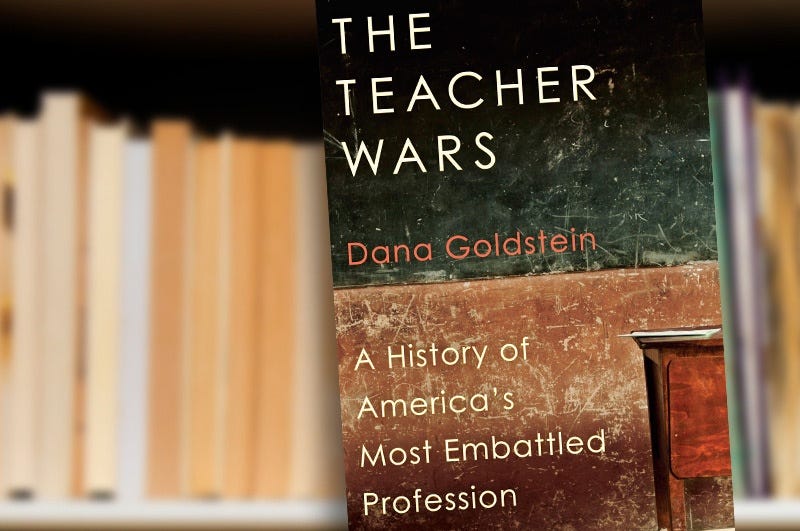Issues That Are No Respecter of Schools
My oldest daughter, a freshman studying elementary education at Montana State University, was assigned to read The Teacher Wars: A History of America's Most Embattled Profession for her EDU101 Teaching and Learning class. Making application from my previous post, I picked it up and read it over the weekend.
Plodding through 175 years of American education felt excruciating at times, not because of the research and writing (which were excellent), but because of the history and heartache chronicled (and experienced particularly by teachers).
As author Dana Goldstein summarized on page 261,
“When American policy makers require every public school to use the same strategies - typically without confirming if their favored approaches are actually effective for kids - they reduce the discretion of the most motivated teachers, whose contributions to the profession should be scaled up, not shut down or ignored.
This is an age-old problem in American education reform. Our system is highly decentralized in terms of curriculum, organization, funding, and student demographics and needs, yet we have expected local schools to implement one-size-fits-all reform agendas imposed from above.
Since political reality suggests we aren't likely to drastically centralize our education system anytime soon, perhaps it is time to look not just to nationally prominent politicians or philanthropists or social scientists to improve schools, but also to teachers themselves."
Goldstein's epilogue, "Lessons from History for Improving Teaching Today," surprisingly then read as if from the playbook of an independent school. Let me share just five (there are plenty more) of her key observations/recommendations for public school improvement, with a sentence or two from me (as a headmaster of an independent school) as to why I agree:
1) Teacher pay matters. Most parents I talk with find it hard to believe that teacher salaries - public or private - are as low as they are (the median annual public school teacher salary in Bozeman is approximately $45,000; Petra's is around $31,000). Even if one believed the lie that "teachers only work nine months out of the year," it's amazing how little schools - public and especially independent - are able to financially compensate those who invest so much in shaping our children.
2) Teaching communities should be able to choose their own curricula, assessments, and teacher evaluation practices. As we like to say at Petra, teachers don't just handle our curriculum; they are our curriculum. Few care as much about what kids are learning as teachers and administrators accountable to local parents rather than state and/or federal politicians and mandates.
3) Long-serving "star" teachers often come from low-income backgrounds, graduate from non-elite colleges, and are people of faith. Mission - not pedigree - is what makes the best teachers. While training and education are important (and we believe in both), the degree that most qualifies a teacher to be in the classroom is the degree to which he or she is committed to the mission of our school. Interestingly (especially for a secular book), Goldstein remarks that people of faith make better teachers, which we would say is a result of being created in the "imago dei," or "image of God," who is the ultimate Teacher.
4) Tests should be returned to their role as educational diagnostic tools, not educational funding metrics. Thankfully, this one is (finally) getting some notice as leading education researchers (not to mention any teacher worth his salt) will tell you that, as Goldstein writes, "...the most authentic use of achievement tests is to diagnose what students know and can do so teachers can better target instruction toward them." I've written on this before, so for Petra's particular take on testing, click here.
5) Be real about the limitations of the public system. And, I would add, any systems (including independent ones) that try too hard or are depended on too much to somehow replace the family or the Church. "We consistently expect teachers and schools to close achievement gaps and panic when they fail to do so," wrote Goldstein, "but we do not provide families with the full range of social supports children need to thrive." This can be just as true of independent schools as public ones, yet we must ideally function only "in loco parentis" - "in the place of" (not "in place of") parents.
Some issues are no respecter of schools, public or independent. Kudos to Dana Goldstein for writing a book The New York Times called "meticulously fair and disarmingly balanced," as well as to Montana State University for including it in their freshman education curriculum.


